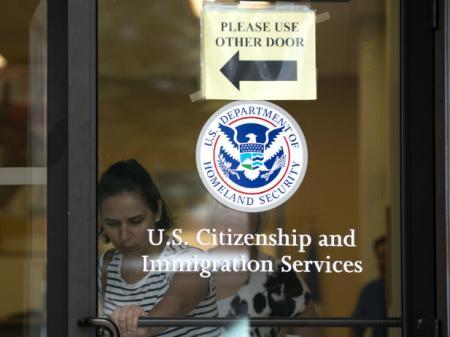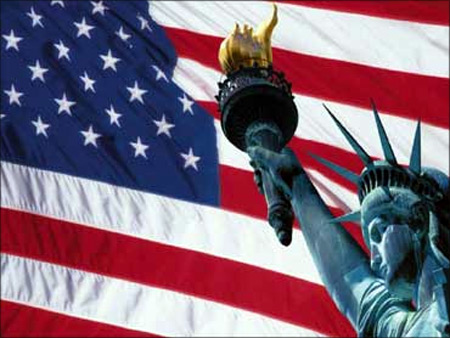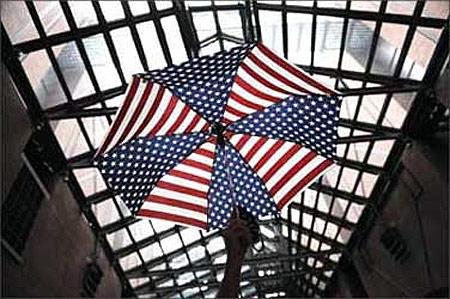Photographs: Reuters Lalit K Jha in Washington
The bi-partisan group of eight US Senators has come out with eight killer provisions in its comprehensive immigration reform bill, which if passed by the Congress, may prove to be detrimental to the interests of major Indian IT companies.
The Senators, also known as the gang of eight, has put forward provisions in the bill, which when signed into law by the President, can harm the interests of Indian IT companies and professionals.
India's Ambassador to the US Nirupama Rao has already flagged the concerns of the Indian companies on the proposed immigration reforms in her meeting with a top American Senator.
. . .
US Immigration Bill may harm Indian IT firms
Image: A woman leaves the U.S. Citizenship and Immigration Services offices in New York.Photographs: Keith Bedford/Files/Reuters
"Highlighting the rapidly growing trade and economic engagement between India and the US, Rao conveyed her deep appreciation to Senator (Robert) Menendez for his support for high-skilled immigration, an issue of significant interest for Indian businesses in the US," Indian Embassy spokesman M Sridharan said in a statement on April 24.
The first killer provision in the Comprehensive Immigration Reform Bill is the ban on client site placement for H-1B workers.
Under this any H-1B dependent employer (a company with more than 15 per cent of its workforce on H-1Bs), would be flatly prohibited from placing H-1B workers at client sites or contracting for the services of those workers.
. . .
US Immigration Bill may harm Indian IT firms
Photographs: Reuters
Secondly, the bill proposes new restrictions on client site placement for L-1 workers.
As a result of this an Indian IT Company would not be able to place L-1 workers (whether specialised or managerial) at client sites (the US company) unless the company supervised and controlled those workers and the parent US company attests that for 90 days before and after the L-1 petition filing it had not laid off any employees in the same area performing similar job duties.
Third, the bill places limit on total percentage of H-1B and L-1 workers.
Under this the immigration bill would impose a hard limit on the percentage of H-1B and L-1 workers that could make up a company's workforce in the US.
. . .
US Immigration Bill may harm Indian IT firms
Photographs: Keith Bedford/Reuters
Being enforced in three phases, the limits would be no more than 75 per cent from October 1, 2014 to September 30, 2015; no more than 65 per cent from October 1, 2015, to September 30, 2016, and no more than 50 per cent from October 1, 2016 onwards.
The US India Business Council and Confederation of Indian Industry have already opposed such a move and said that this is against the spirit of India-US strategic relationship.
The fourth killer provision is said to be the proposed further increase in certain categories of H-1B visas that is targeting Indian IT companies.
. . .
US Immigration Bill may harm Indian IT firms
Photographs: Stanford Conway/Reuters
A company with more than 50 per cent H-1B or L-1 workers currently pays an additional fee of $2,250 for L-1 petitions and $2,000 for H-1B petitions.
Under the comprehensive immigration bill proposals, the additional fee would rise to $5,000 beginning in fiscal 2015 through 2024 for employers with more than 30 per cent and less than 50 per cent H-1B and L-1B workers.
For fiscal 2015 through 2017, there would be a $10,000 fee for employers with more than 50 per cent and less than 75 per cent H-1B and L-1B workers.
Analysts argue that this cost will be passed on or shared by the Indian companies with US companies.
. . .
US Immigration Bill may harm Indian IT firms
Image: The US flag and the Statue of Liberty.Photographs: Reuters
'The Unworkable Intending Immigrants Exception' is said to be the fifth killer provision of the bill.
"Intending immigrants," is defined as those employees for whom the green card process had been started by the company, would count as US workers and would not count toward the H-1B or L-1 population for purposes of determining percentages.
With a sufficient number of intending immigrants, a Global IT Company could conceivably bring its population percentage low enough to avoid the additional fees, and, perhaps, even low enough to avoid being H-1B dependent.
. . .
US Immigration Bill may harm Indian IT firms
Photographs: Reuters
However, the bill has an unworkable qualifier to this exception such that the intending immigrants' exception only applies if the company has filed I-140 immigrant petitions for at least 90 per cent of the employees for which a labour certification was filed in the last year.
As a result, unless the Department of Labor processes labor certification applications very quickly, an Indian IT Company could not rely on the intending immigrants exception since an immigrant petition cannot be filed until Department of Labor approves the labour certification application.
. . .
US Immigration Bill may harm Indian IT firms
Photographs: Reuters
The subsequent required wage increases is considered to be the sixth killer provision of the bill.
Under the proposals H-1B dependent employers would have to pay H-1B workers no less than the mean wage for the occupation, even if the role is entry-level.
This would cause a spiraling effect on the rest of the wage scales, and the wage increases would be substantial, experts note.
For example, the required wage for an entry level Systems Analyst would increase from about $59,000 per annum year to $92,000 per year.
Seventh killer provision is the H-1B recruitment and job offer requirements of the bill, under which prior to filing any H-1B petition, an Indian IT company would be required to recruit for US workers using industry standard recruitment as well as posting on a DOL website, and it would be required to offer the job to any equally or better qualified US worker at the same rate it would have to pay the H-1B worker.
. . .
US Immigration Bill may harm Indian IT firms
Photographs: Reuters
Under this, the US Department of Labor would have authority to review hiring decisions, and the Indian IT companies would need to be able to justify on an applicant-by-applicant basis why individual US worker applicants were not equally or better qualified than a particular H-1B worker.
Finally the significant expansion of government audits and enforcement authority is considered to be the eighth killer provisions under which the Department of Labor would be required to conduct annual compliance audits of all H-1B dependent employers.
Not only this the Department of Homeland Security would be required to conduct annual audits of all companies with a workforce with more than 15 per cent of workers in L-1 status.
. . .
US Immigration Bill may harm Indian IT firms
Photographs: Reuters
The bill also significantly increases DOL's enforcement authority in the H-1B programme and adds new Department of Homeland Security authority to investigate non-compliance in the L-1 programme.
It would relax the requirements to commence an investigation and would give the government substantially more authority to investigate any alleged violations.
In addition, the bill appears to permit initiation of investigations based on data mining by either Department of Homeland Security or the Department of labor, rather than the current requirement that there must be a complaint to commence an investigation.








article